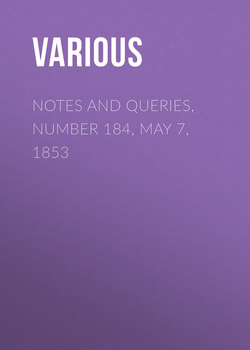Читать книгу Notes and Queries, Number 184, May 7, 1853 - Various - Страница 4
Notes
NOTES AND QUERIES ON BACON'S ESSAYS, NO. III
Оглавление(Vol. vii., pp. 6. 80.)
Essay IX. p. 21. (note a). "They used the word 'præfiscini.'" See e. g., Plaut. Asin., ii. 4. 84. (Weise):
"Præfiscini hoc nunc dixerim: nemo etiam me adcusavit
Merito meo."
(Leonida boasts of his integrity.)
Ditto, p. 22. (note c). "From the Stichus of Plautus," ii. 1. 54.
Ditto, p. 23. "Which has the character of Adrian the Emperor." See Hist. Aug. Script., i. 149., ut supr. (Spartian. Vit. Hadrian. cap. 15.)
Ditto p. 26. "It was well said." By whom?
Essay X. ditto. "A poor saying of Epicurus." Where recorded?
Ditto, p. 27. "It hath been well said, 'That the arch flatterer,'" &c. By whom, and where?
Ditto, ditto. "It hath been well said, 'That it is impossible,'" &c. By whom and where?
Ditto, ditto. "The poet's relation." Ovid. Heroid. xvi. 163.
Essay XI. p. 28. "Cum non sis qui fueris," &c. Whence?
Ditto, p 29. "Illi mors gravis incubat," &c. Seneca, Thyest. 401. (ed. Lemaire), Act II. extrem.
Ditto, p. 31. "That was anciently spoken." By whom?
Ditto, ditto. "Tacitus of Galba." Tac. Hist., i. 49.
Ditto, ditto. "Of Vespasian." Tac. Hist., i. 50.
Essay XII. ditto. "Question was asked of Demosthenes." See Cic. De Orat., III. 56. § 213.
Ditto, p. 32. "Mahomet's miracle." Where recorded?
Essay XIII. p. 33. "The desire of power," &c. Cf. Shaksp. Hen. VIII., III. 2. "By that sin (ambition) fell the angels," &c.
Essay XIII. p. 33. "Busbechius." In Busbequii Legationes Turciæ Epist. Quatuor (Hanoviæ, 1605), p. 133., we find this told of "Aurifex quidam Venetus."—N. B. In the Index (s. v. Canis) of an edition of the same work, printed in London for R. Daniel (1660), for 206 read 106.
Ditto, ditto (note b). Gibbon (Miscellaneous Works, iii., 544., ed. 1815) says, "B. is my old and familiar acquaintance, a frequent companion in my post-chaise. His Latinity is eloquent, his manner is lively, his remarks are judicious."
Ditto, p. 34. "Nicholas Machiavel." Where?
Ditto, p. 35. "Æsop's cock." See Phædrus, iii. 12.
Essay XV. p. 38. "Ille etiam cæcos," &c., Virg. Georg. i. 464.
Ditto, ditto. "Virgil, giving the pedigree," &c. Æn. iv. 178.
Ditto, p. 39. "That kind of obedience which Tacitus speaketh of." Bacon quotes, from memory, Tac. Hist., ii. 39., "Miles alacer, qui tamen jussa ducum interpretari, quam exsequi, mallet."
Ditto, ditto. "As Machiavel noteth well." Where?
Ditto, p. 40. "As Tacitus expresseth it well." Where?
Ditto, p. 41. "Lucan," i. 181.
Ditto, ditto. "Dolendi modus, timendi non item." Whence?
Ditto, ditto. "The Spanish proverb." What is it? Cf. "A bow long bent at last waxeth weak;" and the Italian, "L'arco si rompe se sta troppo teso." (Ray's Proverbs, p. 81., 4th edit., 1768.)
Ditto, p. 43. "The poets feign," &c. See Iliad, i. 399.
Ditto, ditto (note y). "The myth is related in the Works and Days of Hesiod," vv. 47-99., edit. Göttling.
Ditto, p. 44. "Sylla nescivit." Sueton. Vit. Cæs., 77.
Ditto, p. 45. "Galba." Tac. Hist., i. 5.
Ditto, ditto. "Probus." Bacon seems to have quoted from memory, as we find in Vopiscus (Hist. Aug. Script., ut supr., vol. ii. 679. 682.), as one of the causæ occidendi, "Dictum ejus grave, Si unquam eveniat salutare, Reip. brevi milites necessarios non futuros."
Ditto, ditto. "Tacitus saith." Hist., i. 28.
P. J. F. Gantillon, B.A.
(To be continued.)
